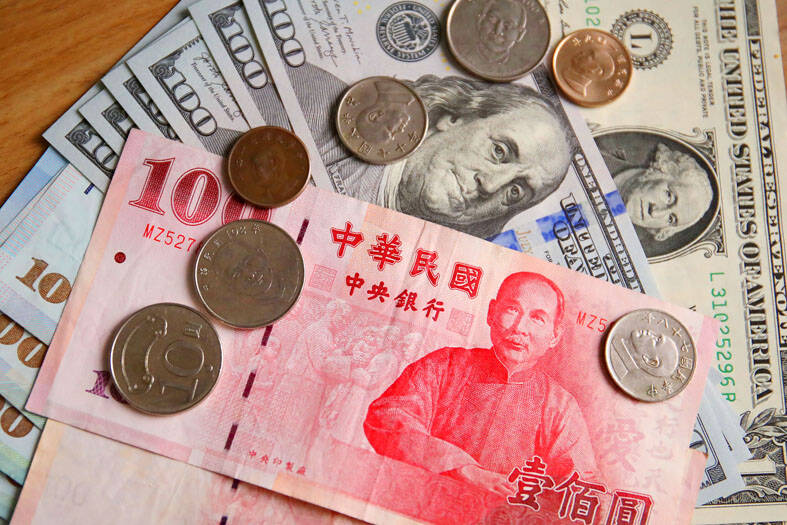The nation’s balance of payments last quarter reported a drop of US$4.12 billion in reserve assets, the first retreat since Europe’s debt woes in 2011, as the central bank poured money into the foreign exchange market to slow the local currency’s depreciation.
Other Asian central banks made the same move and incurred even heavier losses, the central bank said, adding that peers in South Korea, Japan and Singapore also intervened in response to massive capital outflows from Asia to take refuge in the US dollar.
The balance of payments sum up all transactions made with foreign entities by individuals, companies and government bodies in an economy. The figure is commonly used as a reference for monetary policymaking.

Photo: CNA
The central bank said it had no choice but to act to keep the New Taiwan dollar relatively stable, adding that Japan saw its reserve assets from July to September tumble by US$14.4 billion.
It is common for global portfolio managers to send capital and cash dividends abroad, and stay on the sidelines during a financial tumult, the central bank said.
Taiwan’s economy has fared well thus far, although global monetary tightening has cooled demand for consumer discretionary spending, the central bank said.
The current account booked a surplus of US$20.71 billion as global demand for Taiwan-made chips remained strong, even though the surplus shrank by US$6.14 billion from a year earlier due to inventory correction, it said.
Faster imports induced by energy and raw material price gains also weighed on the current account, the central bank added.
The service account posted a surplus of US$3.75 billion, widening by US$500 million from a year earlier, as Taiwan eased COVID-19 restrictions, the central bank said.
In the first three quarters, Taiwan accumulated a current account surplus of US$75.03 billion, while its reserve assets decreased by US$50 million due to measures to support the local currency.

The Eurovision Song Contest has seen a surge in punter interest at the bookmakers, becoming a major betting event, experts said ahead of last night’s giant glamfest in Basel. “Eurovision has quietly become one of the biggest betting events of the year,” said Tomi Huttunen, senior manager of the Online Computer Finland (OCS) betting and casino platform. Betting sites have long been used to gauge which way voters might be leaning ahead of the world’s biggest televised live music event. However, bookmakers highlight a huge increase in engagement in recent years — and this year in particular. “We’ve already passed 2023’s total activity and

Nvidia Corp CEO Jensen Huang (黃仁勳) today announced that his company has selected "Beitou Shilin" in Taipei for its new Taiwan office, called Nvidia Constellation, putting an end to months of speculation. Industry sources have said that the tech giant has been eyeing the Beitou Shilin Science Park as the site of its new overseas headquarters, and speculated that the new headquarters would be built on two plots of land designated as "T17" and "T18," which span 3.89 hectares in the park. "I think it's time for us to reveal one of the largest products we've ever built," Huang said near the

China yesterday announced anti-dumping duties as high as 74.9 percent on imports of polyoxymethylene (POM) copolymers, a type of engineering plastic, from Taiwan, the US, the EU and Japan. The Chinese Ministry of Commerce’s findings conclude a probe launched in May last year, shortly after the US sharply increased tariffs on Chinese electric vehicles, computer chips and other imports. POM copolymers can partially replace metals such as copper and zinc, and have various applications, including in auto parts, electronics and medical equipment, the Chinese ministry has said. In January, it said initial investigations had determined that dumping was taking place, and implemented preliminary

CUSTOMERS’ BURDEN: TSMC already has operations in the US and is a foundry, so any tariff increase would mostly affect US customers, not the company, the minister said Taiwanese manufacturers are “not afraid” of US tariffs, but are concerned about being affected more heavily than regional economic competitors Japan and South Korea, Minister of Economic Affairs J.W. Kuo (郭智輝) said. “Taiwan has many advantages that other countries do not have, the most notable of which is its semiconductor ecosystem,” Kuo said. The US “must rely on Taiwan” to boost its microchip manufacturing capacities, Kuo said in an interview ahead of his one-year anniversary in office tomorrow. Taiwan has submitted a position paper under Section 232 of the US Trade Expansion Act to explain the “complementary relationship” between Taiwan and the US